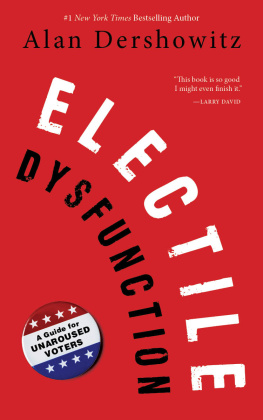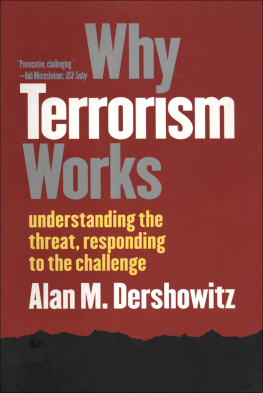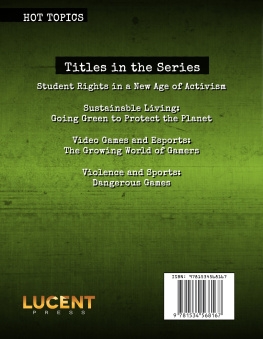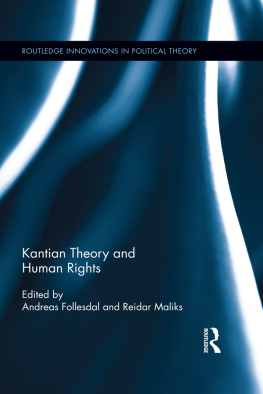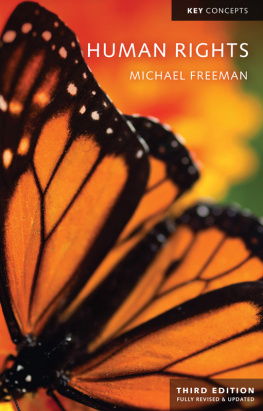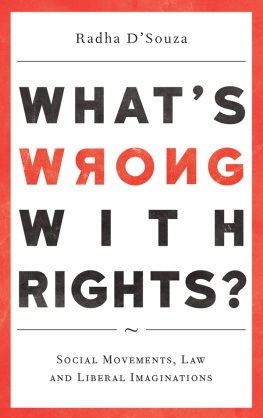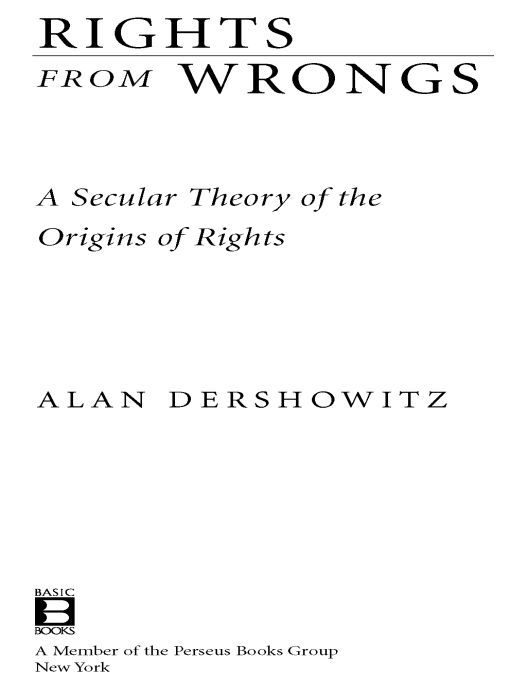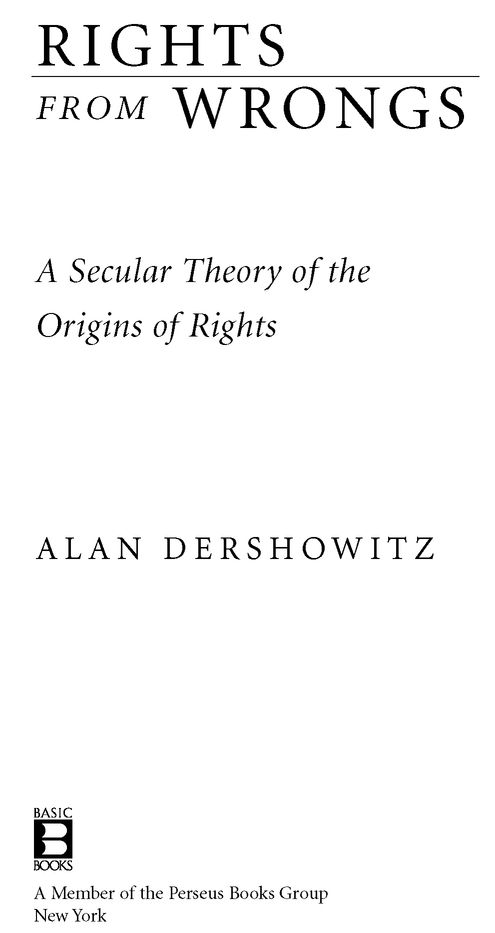Table of Contents
This book is respectfully dedicated to the countless victims of terrible human wrongs-- wrongs that have been the source of human rights. May these rights help to prevent the recurrence of these and other wrongs.
ACKNOWLEDGMENTS
Because Rights from Wrongs represents a summary of my lifes workmy thinking, teaching, writing and advocacy over nearly half a centuryit owes much to many colleagues, students, friends and family. Special thanks to my current research staff: Alex Blenkinsopp for his assistance on footnotes and endnotes and his perceptive comments on the text; Eric Citron, Ayelet Weiss, Sivan Zaitchik and Matthew Stein for their research; Jane Wagner for her all around help in producing the manuscript. A word of appreciation to my editor Bill Frucht for his brilliant improvements, my agent Helen Rees and all the professionals at Basic Books, especially David Shoe-maker. My thanks as well to my Marthas Vineyard friends for their creative kibitzing. As usual, my deepest gratitude and love to family members who encouraged and gently criticized me.
Finally, my appreciation to all those who have participated in the eternal struggle for rights.
INTRODUCTION
Where Do Rights Come From?
IN A WORLD full of wrongs, rights have never been so important. We tend to take our rights for granted until they are endangered, and we appreciate them most when we are at risk of losing them. Today there are powerful forces that pose grave dangers to rights that we have long taken for granted. At the same time, many defenders of rights insist that we accept the case for them essentially on faith. The debate has become polemical, with one side arguing that the new reality of global terrorism changes everything, while the other argues that it changes nothing. A more nuanced discussion is needed to strike the appropriate and ever-changing balance between security and liberty. Any such discussion must include the question: Where do rights come from? The answer to this question is important because the source of our rights determines their status, as well as their content.
Our founding document of liberty, the Declaration of Independence, pointed to God as the source of our rights. Among the truths that were regarded by our founding fathers as self-evident was the proposition that certain rights were unalienable because their source was neither government nor popular acceptance, but the endowment of the Creator. What God gives, no human can take away. As the young Alexander Hamilton insisted on the eve of the American Revolution: The sacred rights of mankind are not to be rummaged for among old parchments or musty records.... They are written, as with a sunbeam, in the whole volume of human nature by the hand of the divinity itself and can never be erased or obscured by mortal power.
If only it were that simple! If only it were true that a God, in whom everyone believed, had come down from the heavens and given the entire world an unambiguous list of the rights with which He endowed us. How much easier it would be to defend these sacred rights from alienation by mere mortals. Alas, the claim that rights were written down by the hand of the divinity is one of those founding myths to which we desperately cling, along with the giving of the Tablets to Moses on Sinai, the dictation of the Koran to Muhammad, and the discovery of the Gold Plates by Joseph Smith.
To the extent the divine source and unalienability of our rights are purported to be factual, history has proved our founding fathers plainly wrong: Every right has in fact been alienated by governments since the beginning of time. Within a generation of the establishment of our nation, the founding fathers rescinded virtually every right they had previously declared unalienable. John Adams, one of the drafters of the Declaration of Independence, alienated the right to speak freely and express dissenting views when, as president, he enforced the Alien and Sedition Acts against his political opponentswith Hamiltons strong support. (Perhaps Hamiltons God had not given sacred rights to Jeffersonians!) Another of the drafters, Thomas Jefferson, alienated the most basic of rightsto the equal protection of the laws, based on the truth that all men are created equalwhen he helped to write (and strengthen) Virginias Slave Code, just a few years after drafting the Declaration of Independence. The revised Code denied Negro slaves the right to liberty and to the pursuit of happiness by punishing attempted escape with outlawry or death. Jefferson personally suspected that the blacks... are inferior to the whites in the endowments of body and mind. In other words, they were endowed by their creator not with equality but with inferiority.
There is no right that has not been suspended or trampled during times of crisis and war, even by our greatest presidents. Washington was a strong supporter of the Alien and Sedition Acts. Lincoln suspended the writ of habeas corpus. Wilson authorized the Palmer raids, in which his attorney general seized, arrested, and imprisoned thousands of suspected radicals in violation of their rights. Roosevelt ordered the detention of more than 100,000 Americans of Japanese descent without even a semblance of due process. He also convened a military tribunal to trywithout a juryan American citizen caught spying for Germany in the United States. And Presidents Truman and Eisenhower, despite their personal dislike of Senator Joseph McCarthy, alienated the rights of political dissent during the Cold War by enforcing the persecution of Communists, former Communists, and those suspected of leftist sympathies.
These precedents and others have been cited by President George W. Bush, his attorney general, and some judges to justify the alienation of some of our most important rights (perhaps Bushs God did not bestow these rights on American citizens suspected of terrorism or foreigners detained at Guantanamo, Cuba). The difference is that in the past, the alienations were temporary, lasting only as long as the war or emergency. But the war against terrorism is, by its nature, unending. There will be no formal surrender by our current enemies. There will be no peace treaty, parades, or victory days. Whatever alienations of our fundamental rights are authorized by the courts today will endure for generations. Alienation may well become the norm.
If we most appreciate our rights when they are at risk, then the time has come to show appreciation and to struggle for the preservation of our most important rights. I wish I could make an intellectually satisfying argument for the divine source of rights, as our founding fathers tried to do. Tactically that would be the strongest argument, especially in America where many hold a strong belief in an intervening God. But I cannot offer this argument, because I do not believe in concepts like divine hands, unalienability, or self-evident truths. I am a pragmatist, a utilitarian, an empiricist, a secularist, and (God forgive me!) a moral relativist. I reject absolutes (except that my rejection of absolutes is itself fairly absolute; as George Bernard Shaw cynically quipped: The golden rule is that there are no golden rules.).
There is no right that is not, in my view, immune from some alienationor balancingunder certain extreme circumstances. Nevertheless, I believe strongly in the concept of rights, and in certain specific rights such as those of equality, due process, freedom of conscience and expression, democratic participation, life, and liberty. I have devoted my life to trying to expand these and other rights and to trying to prevent their alienation. Though I accept the reality that rights can, in fact, diminish in extreme circumstances, the mere possibility that these circumstances may occur should not determine the content of rights during the merely difficult times that challenge every society. It is one of the important functions of rights to prevent (or slow down) popular wrongs during difficult times. Extremes should be regarded not as the norm but as the exceptions. The slippery slope is not an argument against ever contracting any rights, merely a caution against their too-easy alienation.


